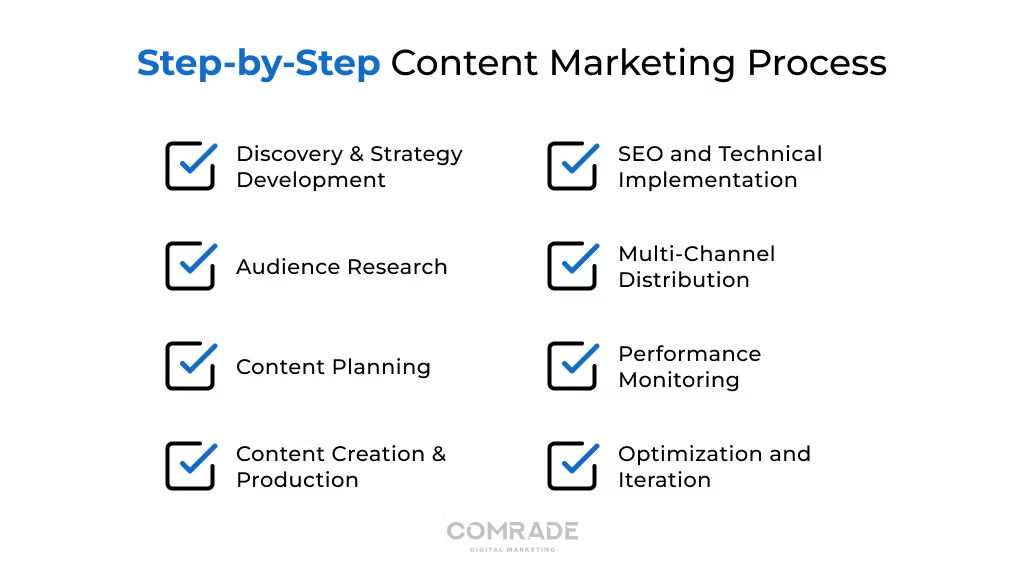
Phase 1: Discovery and Strategy Development
We begin every content marketing engagement with an in-depth discovery phase. Our Chicago-based team conducts thorough market research to understand your industry landscape, competitive positioning, and unique value propositions.
During this phase, we analyze your existing content assets, identify gaps in your current strategy, and uncover opportunities for growth. We also dive deep into understanding your business goals, whether that’s building brand awareness, generating qualified leads, or establishing thought leadership in your industry.
Phase 2: Audience Research and Persona Development
Understanding your audience is the cornerstone of effective content marketing. As a leading content marketing agency, Comrade’s team develops detailed buyer personas that go beyond basic demographics. We explore:
- Pain points and challenges your audience faces
- Their content consumption habits and preferred channels
- Decision-making processes and key influencers
- Questions they’re asking at each stage of the buyer’s journey
This research forms the foundation to make sure your content strategy aligns with your target market and addresses their specific needs at the right time.
Phase 3: Content Planning and Editorial Calendar Creation
With strategy and audience insights in hand, we develop a comprehensive content plan. Get a major edge by choosing the right content marketing agency’s services. Our editorial calendar maps out content themes, topics, and publishing schedules across all channels. We ensure a balanced mix of impactful content types that serve different purposes – from awareness-building blog posts to conversion-focused case studies. The calendar also incorporates seasonal trends, industry events, and your business’s key marketing initiatives to maximize relevance and impact.
Phase 4: Content Creation and Production
This is where strategy transforms into compelling content. As a top-rated content marketing company, Comrade’s experienced writers, designers, and multimedia specialists collaborate to produce high-quality content that reflects your brand voice and engages your audience. Our creation process includes:
- Research and outlining to ensure accuracy and depth
- Professional writing that balances SEO requirements with readability
- Visual design that enhances understanding and engagement
- Multiple rounds of editing to ensure quality and consistency
We produce various content formats, including blog posts, whitepapers, infographics, videos, podcasts, and social media content, selecting the most effective formats for your specific goals and audience preferences.
Phase 5: SEO and Technical Implementation
Every piece of content undergoes rigorous SEO (search engine optimization) to ensure maximum visibility in search results. Our Chicago team conducts keyword research, optimizes meta descriptions, implements proper heading structures, and ensures technical SEO elements are properly configured. We also focus on creating topic clusters and internal linking strategies that boost your overall domain authority and help search engines understand your content’s relevance and expertise
Phase 6: Multi-Channel Distribution and Promotion
Creating great content is only half the battle – getting it in front of the right audience is equally crucial. Comrade implements a multi-channel distribution strategy that may include:
- Email marketing campaigns to nurture leads
- Social media promotion across relevant platforms
- Paid advertising to amplify reach
- Influencer and partner collaborations
- PR outreach for high-value content pieces
We tailor the distribution approach based on where your audience is most active and engaged, ensuring maximum return on your content investment.
Phase 7: Performance Monitoring and Analytics
Data drives continuous improvement in our content marketing approach. We track key performance indicators, including website traffic, engagement rates, conversion metrics, and ROI. Our team provides regular reports that highlight what’s working, what needs adjustment, and emerging opportunities. This data informs ongoing strategy refinements and helps demonstrate the tangible value of your content marketing investment.
Phase 8: Optimization and Iteration
Content marketing is an iterative process, and Comrade believes in continuous improvement. Based on performance data and changing market conditions, we regularly update and optimize existing content, test new formats and approaches, and refine our strategy to ensure sustained success. This might involve updating older posts with fresh information, repurposing high-performing content into new formats, or adjusting our editorial calendar based on emerging trends.
Content Marketing’s Role Within an All-Inclusive Marketing Approach
Content marketing is one of the strongest tools in Comrade Digital Marketing’s all-inclusive marketing approach. From our Chicago office, we help brands craft valuable, audience-focused content that fuels every other part of their marketing strategy.
By creating consistent, high-quality content, you not only connect with your audience but also give your other marketing channels the assets they need to perform at their best.
How content marketing supports other strategies:
- SEO Strategy and Execution: Optimized content helps search engines understand and rank your site for relevant queries.
- PPC Campaigns: Quality landing page and ad copy increase conversions and lower cost-per-click.
- Social Media Marketing: Engaging posts and shareable articles keep followers interested and active.
- Email Marketing: Targeted, valuable content nurtures leads and improves open and click-through rates.
- Brand Authority: Thought leadership articles establish authority and trust in your industry.
Content works best when it’s not siloed but strategically integrated. A blog post can double as a newsletter feature, fuel social conversations, and support a PPC ad group — all while driving organic traffic.
At Comrade, we ensure each piece of our content marketing effort is created with this cross-channel synergy in mind. This approach maximizes ROI, shortens the path to conversions, and ensures your marketing investments work together toward common marketing goals.
How Content Marketing Drives Your Local Growth and Our Role in It
Reaching your local audience, building trust, and creating loyal customers is easier with the right content marketing strategy. From our office in Chicago, Comrade Digital Marketing delivers tailored campaigns that elevate your brand to the top of your community’s mind.
Our role is to plan, produce, and promote high-quality, locally relevant content that attracts customers and keeps them engaged.
How we help your business grow locally with content marketing:
- Develop location-focused blog posts, guides, and resources
- Optimize content for Chicago-area relevant keywords and search intent
- Build internal and external links with local relevance
- Promote through social media targeting nearby audiences
- Monitor analytics to refine campaigns for better local ROI
By tailoring your content to your community, we ensure your brand identity stands out in local search results and resonates with the people most likely to buy from you.
With Comrade’s data-driven approach, you get more than content — you get a business growth engine fueled by strategy, creativity, and measurable results.
How Comrade Customizes Solutions for Every Industry
At Comrade Digital Marketing in Chicago, we understand that every industry faces unique challenges and opportunities when it comes to content marketing. That’s why we tailor our strategies to meet the specific goals, audience behaviors, and competitive environments of each client we work with.
Our team uses deep market research, content marketing performance data, and industry trends to design content campaigns that drive engagement and measurable results.
We don’t believe in one-size-fits-all solutions. Instead, we take the time to understand your brand voice, target demographics, and competitive landscape before building a plan.
By blending creativity with analytics, Comrade ensures your content doesn’t just look good — it works hard to attract, engage, and convert your ideal audience.
Work With Comrade to Achieve Lasting Results
Content marketing isn’t just about publishing articles — it’s about creating a consistent, strategic flow of high-quality content that speaks to your audience and drives measurable results. At Comrade Digital Marketing, we combine data-driven, valuable insights with creative execution to ensure your brand message resonates across every channel and keeps your audience engaged over time.
Whether you need blog articles, website copy, or full-scale content campaigns, our team delivers work that aligns with your business goals and fuels growth. Let’s create content that not only tells your story but also positions you as an authority in your industry — partner with Comrade and start building long-term success today.














